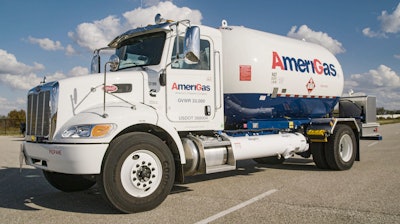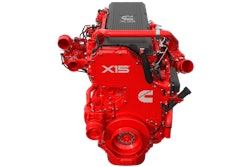
Medium-duty fleet owners looking to invest in an alternative energy source that provides clean and affordable benefits have new technology to turn to with the Cummins B6.7 Propane.
The 6.7-liter displacement engine will be built on Cummins' recently-announced, fuel-agnostic, B-series platform and powered with propane Autogas. The engine is backed by data and support from the Propane Education & Research Council (PERC), the companies say.
“There is no single path to zero emissions that will work for all application types across all markets and duty cycles. Propane autogas can do its part today in the collective effort toward decarbonization,” said Tucker Perkins, president and CEO of PERC. “Using propane autogas today is an immediate solution toward reducing harmful emissions.”
The new engine will provide fleet owners with diesel-like performance and durability, uptime and low total cost of ownership, with power expected ratings between 280–360 hp and 600–860 lb-ft of torque.
The B6.7 Propane is suited for several applications, including medium-duty truck, vocational, school bus, and terminal tractor markets, making it a low-emissions solution designed to meet or exceed EPA and CARB regulations in 2024 and beyond.
“We’ve had a strong and collaborative relationship with PERC throughout the development, testing and evaluation phases of this engine. We’re thrilled to continue that partnership and formally announce plans to bring the B6.7 Propane to market,” said Sam Geckler, technical project leader, Cummins.
“We’re confident this engine will deliver the power, performance and efficiency that users expect from Cummins. We also expect it to deliver the lowest CO2 emissions of any propane Autogas-powered engine, making it an attractive and cost-effective way for fleets to lower total transportation emissions,” Geckler said.
In addition to offering performance and emissions benefits, fleets that use propane autogas benefit from a reduced total cost-of-ownership thanks to low costs for fuel, maintenance, and refueling infrastructure. As an abundant and affordable energy source, propane autogas allows fleet owners to integrate lower emission vehicles with minimal disruption to their operations, making a bigger impact on the environment. Propane infrastructure is affordable, scalable, and ready today.
Reports from climate groups around the world demonstrate the importance of implementing low-emissions energy sources as soon as possible, and they make clear that we don't have time to wait for a one-size-fits-all solution to decarbonization. With over $9 billion in grant money available for propane autogas vehicles and infrastructure through the 2021 Infrastructure Investment and Jobs Act, fleet owners in communities across the country will be able to begin accelerating decarbonization by easily and affordably adopting propane autogas.

















